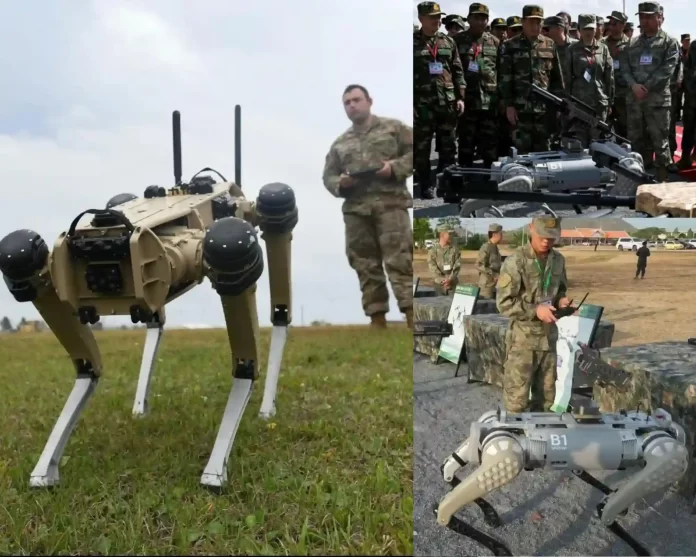China’s armed forces recently showcased a new addition to their arsenal: robot dogs armed with automatic rifles. This demonstration took place during the Golden Dragon 2024 exercise, a joint military drill with Cambodia held from May 16 to May 30. The exercise focused on addressing non-traditional security threats, such as counter-terrorism, humanitarian relief, and anti-piracy operations.

The robotic canines, designed by Chinese company Unitree, are made with integrated advanced technology that allows them to conduct recon, distinguish, and attack a target while feeding back real-time footage to command posts. They can negotiate rough ground, plan routes, avoid obstacles, and fire their weapons independently. So far, the robots shown in Cambodia were capable of nothing but walking in front of journalists and high-ranking military officials; no actual firing was seen.
Surprisingly, these robots weigh 50 kg and can carry and fire a machine gun. It is remote-controlled by a soldier. The prospects of robotic dogs have a lot to say concerning warfare in the future. Dynamics on the battlefield are moving on with the integration of robotics and artificial intelligence into military operations.
These machines are not limited to just weaponry but also can supply, scout hazardous areas, and even be a decoy, helping the human soldiers and hence improving operational effectiveness.

The concept of using robots in warfare is not new. the U.S. military has a long history of robots deployed as far back as World War II. Robots like the PackBot were used in the war in Afghanistan to scout and detonate bombs, a task usually performed by soldiers. The U.S. has also tried robotic fighting vehicles equipped with heavy machine guns to show the technology that might be used in modern warfare.
China’s recent demonstration of robotic dogs is a clear indication of its commitment to integrating advanced technology into its military operations. While these robots are impressive, experts like Benjamin Jensen from the Center for Strategic and International Studies (CSIS) suggest that they are not yet as advanced as those used by the U.S. military. Jensen points out that effective operation of these robots still requires human oversight, highlighting the importance of human-machine integration on the battlefield.
The integration poses numerous challenges: how robust and intuitive the networks ought to be, safeguarding against cyber breaches and ensuring the optimal degree of autonomy and safety. The ethical and legal issues are also a bone of contention regarding the implementation of weapons systems that have the capacity for autonomous decision-making without direct human intervention. These are sensitive issues considering the continuous effort in military R&D to find newer ways in which robotics and AI are used innovatively within the battlefield.
The U.S. Department of Defense has thus taken it upon itself to be proactive, initiating projects like the Replicator Initiative, whose aim is to deliver thousands of uncrewed vehicles to address prospective threats, particularly from China. The Replicator Initiative focuses on uncrewed surface vehicles, the aerial system, and the counter-uncrewed aerial system in view to minimize casualties on the part of the United States of America and assure strategic deterrence.
As clear as the advantages of robotic systems are, in the military application, the disadvantages are significant. The robustness of autonomous systems, cybersecurity measures, and ethical issues are important to successfully incorporate these technologies. With the United States and China moving forward with their advanced military robotics, the face of modern warfare is set to change dramatically.
However, the creation of such autonomous weapons poses serious ethical concerns. China and the US have both claimed that human control should not get lost over developing such potent machines. The international community is worried that fully autonomous weapons might be used to aggravate conflicts and cause civilian deaths. According to current protocols, the ultimate decision to fire a gun must lie with the human in–charge. This flows from a highly cautious approach to using AI in wars.
While the ‘war hounds’ are a rather significant technological breakthrough, their practical effectiveness is still an open question. For example, their lifespan is from two to four hours, which means it can be impossible to fulfill the mission after a specific time.
Not only could robot dogs be used in the military, but they could also support different sectors if commercialized.
Search and Rescue: The best navigation for disaster areas.
Inspection and Maintenance: It is helpful in the inspection of infrastructure in reaching inaccessible areas.
Delivery Services: Would deliver goods in challenging situations.
Health: Can be used to deliver medical supplies to quarantine zones.
Agriculture: It has the potential to assist with monitoring crops and livestock.
Entertainment and Research: It offers a promise to theme parks and movie sets and is helpful for scientific explorations.
The debut of China’s machine gun-wielding robot dogs is a testament to the rapid advancements in military technology and the ongoing competition between global superpowers. As these technologies evolve, so too will the strategies and tactics employed on the battlefield, emphasizing the need for continuous innovation and careful consideration of the ethical implications of autonomous warfare.
Current research and development are thereby focused on increasing the potential of AI applications in the military and minimizing associated risks that pertain to ethics and strategies. China’s hardware, the AI hounds firing rounds of machine guns, is more of a testament to the potential of AI in transforming war. At the same time, it should underscore the urgency of constantly discussing and regulating such advances for responsible use and ethics.
All eyes are on its deployment into battle and, by extension, what the future may hold for world military strategies.


